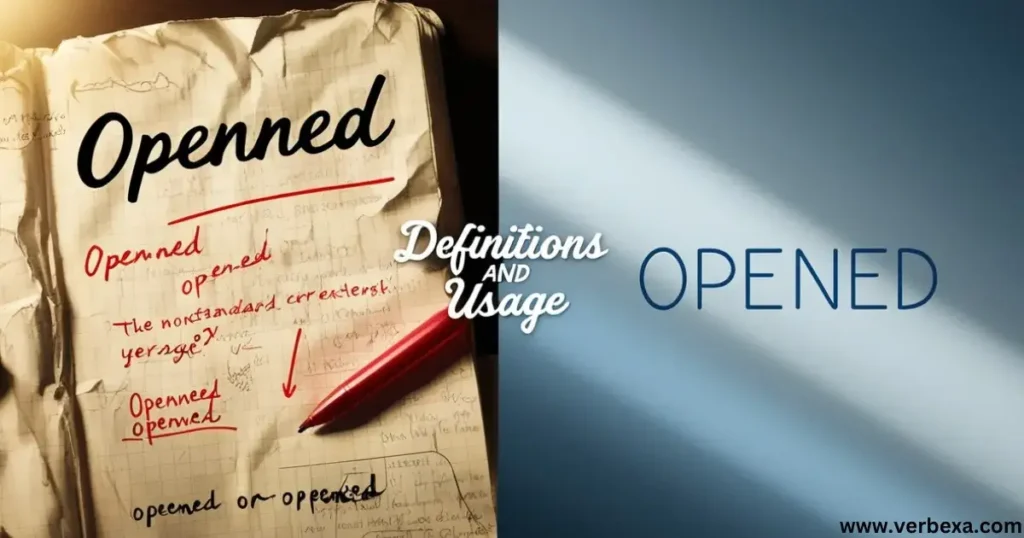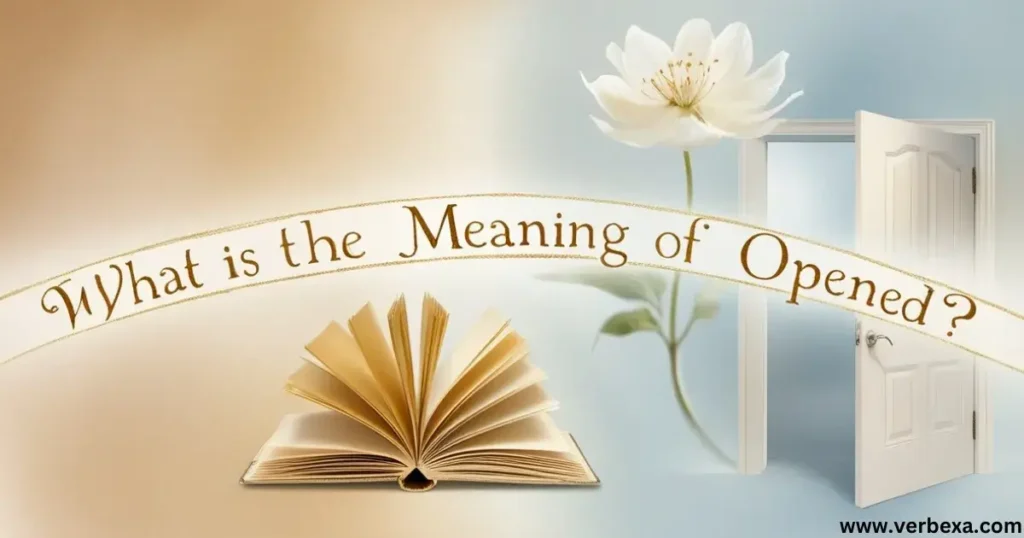When it comes to mastering the English language, spelling errors are a common obstacle. One such issue that often confuses both native speakers and learners of English is the use of “openned” vs. “opened.” While they might sound alike, only one is correct. In this article, we will break down the differences, definitions, and usage of these two terms to ensure you never make this mistake again. So, let’s explore the confusion surrounding “Openned Or Opened” and provide some clarity through clear examples, comparisons, and practical tips.
What Is the Correct Spelling: Openned Or Opened?
At first glance, both “openned” and “opened” might seem plausible as past tense forms of the verb “open”. However, only one is correct. Let’s clarify:
- Opened is the correct past tense and past participle of “open”. It is the form used to describe an action that has already occurred or to describe something that has been unsealed or accessed.
- Openned, on the other hand, is a common misspelling of “opened.” Despite sounding the same, “openned” is not a valid word in standard English grammar.
Why Is It Important to Differentiate Between “Openned Or Opened”?
Correct spelling is crucial for clear communication, whether you’re writing an email, an essay, or even texting a friend. Using “opened” instead of the incorrect “openned” shows attention to detail and helps maintain your credibility, especially in professional settings.
Quick Answer:
- Correct: Opened
- Incorrect: Openned
Definitions and Usage: Openned Or Opened

Now that we’ve established which word is correct, let’s delve deeper into their definitions and usage.
Opened: Definition and Usage
The word “opened” is the past tense of the verb “open.” It means to make something accessible, unsealed, or revealed. “Opened” can also be used as a past participle in perfect tenses (e.g., “He has opened the door”).
Examples:
- She opened the door to find a surprise waiting outside.
- The teacher has opened the discussion to the entire class.
- He opened the box and saw the gift inside.
Openned: Definition and Usage
“Openned” is simply a misspelling of “opened”. While this form is often heard or seen in informal settings, it is never grammatically correct. The inclusion of the extra “n” is unnecessary and goes against standard spelling rules for regular verbs.
- Incorrect Usage: I openned the package.
- Correct Usage: I opened the package.
Why is “openned” wrong? English verbs that end in “-e” (like open) usually add just “-d” in their past tense form. The “-ed” ending should be used without the extra “n.”
Synonyms for Opened
To avoid repetition and spice up your vocabulary, here are some synonyms for “opened” in various contexts:
- Unsealed
- Unlocked
- Revealed
- Exposed
- Unfastened
- Disclosed
- Accessed
- Unwrapped
- Initiated
- Started
Synonyms for Openned
Since “openned” is a misspelling, there are no direct synonyms. Instead, you can use the correct form “opened” and its synonyms as alternatives.
Comparison Table: Openned vs. Opened
| Aspect | Openned | Opened |
|---|---|---|
| Definition | Incorrect past tense of “open.” | Correct past tense of “open.” |
| Usage | Not accepted in formal or informal writing. | Accepted in all forms of writing. |
| Examples | He openned the box. | He opened the box. |
| Grammar Rule | Violation of standard verb conjugation rules. | Follows regular verb rules. |
| Context | Only used in informal contexts due to error. | Correct in business, academic, casual, and formal writing. |
When to Use Each Term
Now that we’ve established that “opened” is the correct form, it’s important to note when to use it appropriately:
- Use “opened” when referring to the past tense of “open” in any formal or informal setting. For instance, when talking about physically opening something or in more abstract uses (e.g., opening an opportunity).
Everyday Usage Examples:
- Business: I opened the email you sent this morning.
- Technology: She opened the app to check her messages.
- Literature: The novel opened with a gripping scene of mystery.
- Casual: He opened the door to greet his friends.
What About “Openned”?
Since “openned” is not correct, there’s really no proper context for it. If you’ve used “openned” before, simply switch it out for “opened” in your writing or speech.
How Do You Spell Opened?
The correct spelling of opened is o-p-e-n-e-d. It’s easy to remember that you simply add the “-ed” to the verb “open” to indicate that the action happened in the past. This follows the typical rule for verbs ending in “-e,” like “dance” → danced, “close” → closed, etc.
Example of Correct Spelling in Sentences:
- The store opened at 9 AM.
- She opened the letter carefully.
Usage in Business and Technology
In business and technology, proper spelling is key to maintaining professionalism and clarity in communication. “Opened” is widely used across various platforms like software applications and emails.
Tech Terminology:
- “I opened the app” – Refers to starting or accessing an application.
- “The document was opened on my computer” – Describes the action of accessing a file.
In business, emails and digital platforms also require clear and error-free communication, where “opened” ensures professionalism. Correct spelling is essential in these environments to maintain clarity and precision.
Usage in Literature and Art
Literature and art often employ “opened” to evoke a sense of discovery or new beginnings.
Literary Example:
- “The novel opened with a dark and stormy night.”
- “Opened” in this context helps set the tone for what’s to come.
Artistic Expression:
- “The exhibit opened a conversation about culture.”
Here, “opened” metaphorically describes the start of a meaningful dialogue or thought.
Usage in Sports and Events
In sports commentary and event descriptions, “opened” is a commonly used term.
In Sports:
- “The game opened with a spectacular goal.”
Describes the beginning of an exciting event.
Used in Event Planning:
- “The festival was officially opened by the mayor.”
Signifies the start of an event.
Why “Opened” is Preferred Over “Openned”
Language Evolution: English verbs tend to follow regular patterns, such as adding “-ed” to form the past tense. “Openned” is a misstep that breaks from this convention.
Consistency in Language: Using “opened” helps ensure clarity and professionalism, avoiding confusion in formal communication.
Common Mistakes: People may mistakenly write “openned” due to how it sounds, but it’s important to recognize the correct form.
What to Say Instead of “Opened”
If you want to avoid repetition or want to specify actions more precisely, consider these alternatives:
- Unlocked
- Unsealed
- Accessed
- Revealed
- Initiated
- Launched
What Is the Past Perfect Tense of Open?
The past perfect tense of “open” is “had opened”. For example:
- “By the time I arrived, they had opened the package.”
This tense indicates that the action of opening happened before another action in the past.
The Proper Tense of “Open”
The verb “open” can be used in various tenses:
- Present Tense: “I open the door every morning.”
- Past Tense: “I opened the door yesterday.”
- Future Tense: “I will open the door later.”
What Is the Meaning of Opened?

“Opened” is the past tense and past participle of the verb “open,” meaning to make accessible or to reveal. For example:
- “He opened the door to opportunity.”
In Urdu:
“Opened” can be translated as “کھولا” in Urdu.
Phrasal Verb of “Open”
The phrasal verb “open up” carries a slightly different meaning:
- “He opened up to new ideas.”
It implies revealing thoughts or emotions.
Contextual Use:
- “She opened up about her past.”
This shows a figurative use, where “open up” means to share personal information.
Alternative Phrases and Idiomatic Expressions
“Open to” as an Idiom:
- “I’m open to suggestions.”
Here, “open to” means being receptive or willing.
Synonyms for “Opened” in Idiomatic Expressions:
- Unveiled
- Uncovered
- Launched
These alternatives can help vary your expression in writing or speech.
Common Mistakes with “Openned”
Many English learners struggle with verbs that end in “-e.” In these cases, it’s important to remember that the past tense form should not have an extra “n.” For example, “openned” is a typo, while “opened” is correct.
Why Is “Openned” Not a Valid Word?
In English, the conjugation of regular verbs follows consistent patterns. The verb “open” is no exception. When changing it to the past tense, we add “-ed”, without an additional “n.” The extra “n” in “openned” doesn’t align with the standardized spelling rules, which is why it is incorrect.
Spelling Tips: How to Avoid Misspelling “Openned”
Here are a few tips to help avoid common misspellings like “openned”:
- Proofread carefully. Check your writing for any extra letters, especially in regular verbs that end in “-e.”
- Use spell-check tools. These tools can help catch most common mistakes, including errors like “openned.”
- Practice spelling regular verbs. Memorize the spelling patterns of regular verbs to reduce the risk of errors.
- Review verb conjugation rules. Understanding how English verbs conjugate helps prevent confusion.
Phrasal Verb Usage: “Opened Up”
In addition to the basic past tense “opened,” English speakers often use phrasal verbs like “opened up” to mean revealing or sharing information, thoughts, or emotions. This is an example of metaphorical usage where the literal meaning of “open” extends to more figurative situations.
Examples of “Opened Up” in Sentences:
- He opened up about his struggles at work.
- The discussion opened up new ideas for collaboration.
Conclusion: Key Takeaways on Openned Or Opened
To sum up, “opened” is the only correct term when referring to the past tense of “open.” Understanding the rules of verb conjugation can help you avoid errors like “openned”, which is a common misspelling. Whether you’re writing emails, essays, or casual texts, using the correct form enhances your credibility and ensures clear communication.
Remember, “opened” is the go-to word in any context. It’s essential to improve your writing skills by understanding and practicing the right grammar and spelling conventions. The next time you’re unsure whether to use “openned” or opened,” just recall the rule: the correct form is always “opened.”

This author is a passionate linguist and grammar enthusiast, dedicated to helping individuals master the art of language. With years of experience in teaching and editing, she brings clarity and precision to every sentence. Tina’s mission is to empower writers of all levels to express themselves with confidence and excellence.

![Openned Or Opened: Spelling + Examples [2025]](https://verbexa.com/wp-content/uploads/2025/02/openned-or-opened-spelling-examples-2025.webp)